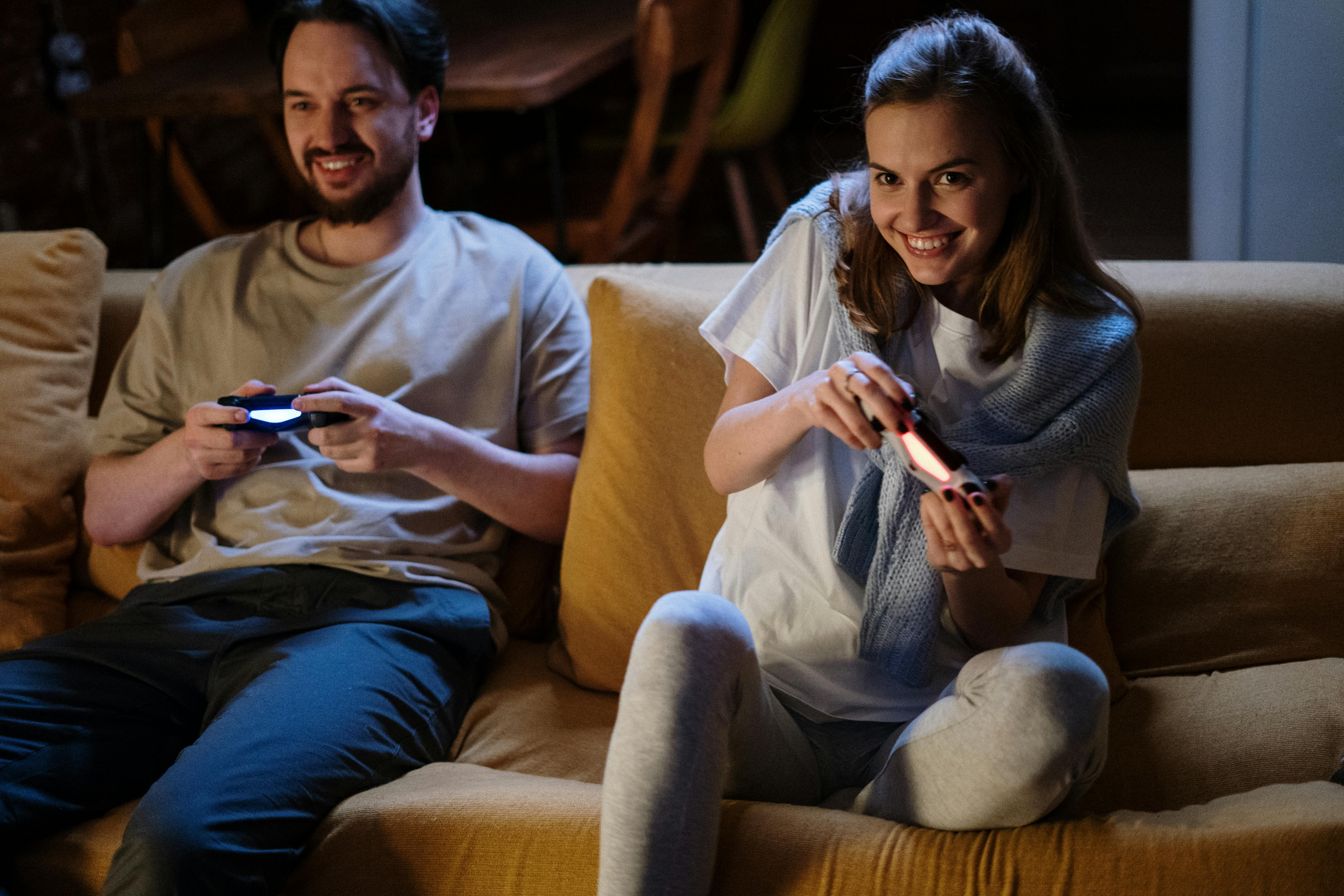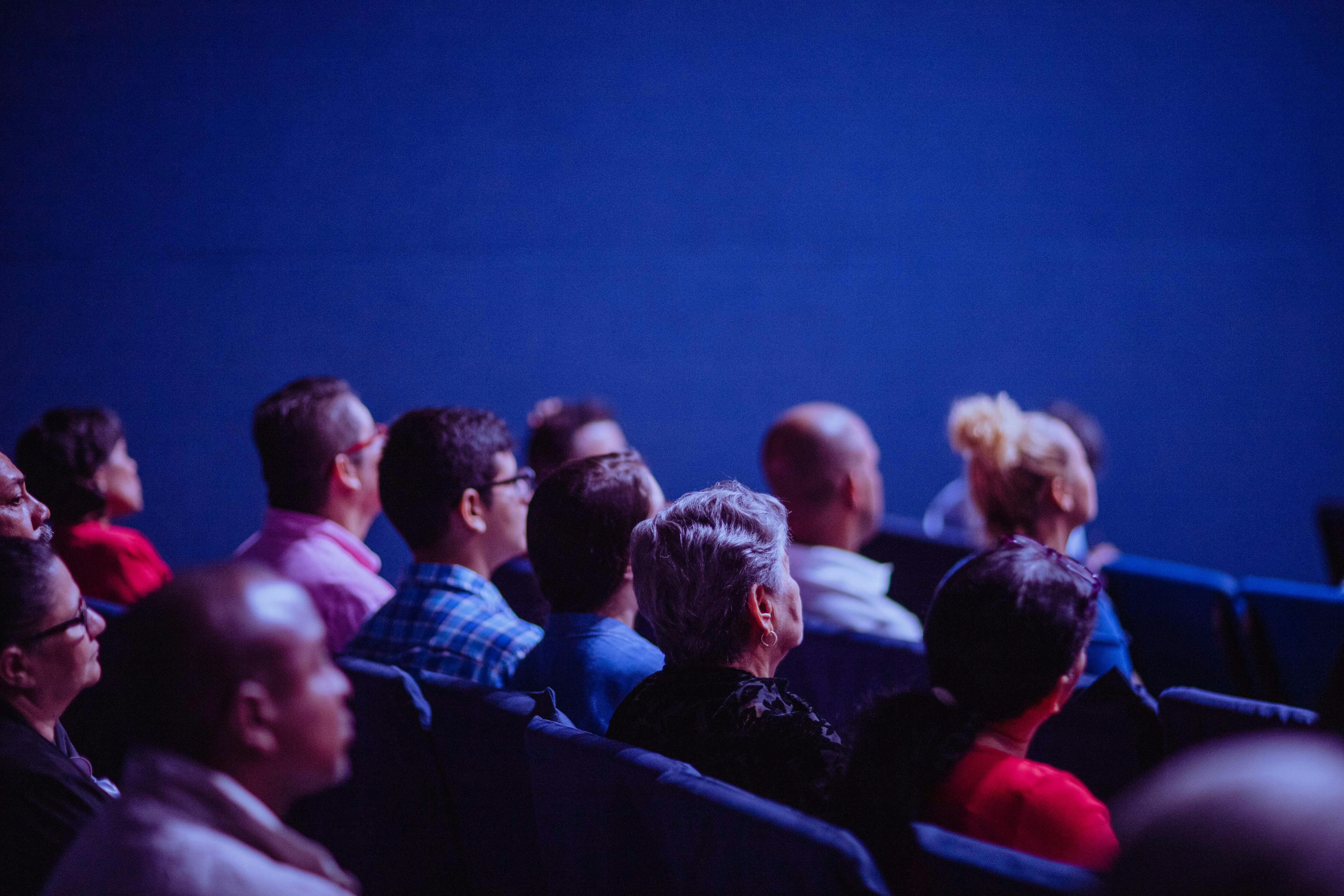Love is in the cloud: Dating & relationship advice - Appinio Hype Train
Appinio Research · 27.02.2023 · 23min read
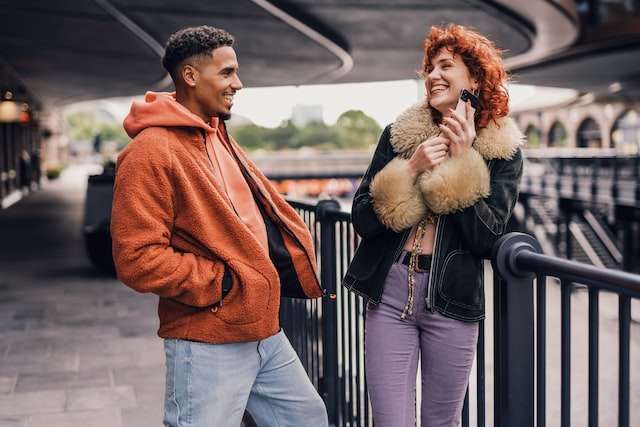
Content
As February is Valentine's Day month, the topic of dating and relationships is at the forefront of people's minds. To gain some insights into how people feel about dating and relationships, Appinio conducted a study with a nationally representative sample of 1000 Brits to explore the intricacies of relationships and the impact of dating apps.
In this article, we'll discuss the results of the Hype Train study conducted with the help of our special guest Jorge Bueso, Senior Consumer Research and Insights Manager at Spark Networks, including how people get into relationships, the experiences of single people, the role of dating apps in the search for romance and the newest trends in the dating world.
Appinio has consolidated all the valuable insights on the complex and ever-evolving landscape of modern romance in a 10 pages report, download the report for free now!
"Can't help falling in love": How people get into romantic relationships
Finding love can be a challenging and often elusive pursuit, but there are many different paths that people take to get there. From traditional ways of meeting someone through mutual friends or at social events to the growing popularity of online dating apps, how people connect is constantly evolving. In this section, we'll explore how partnered Brits got into their relationship.
According to the latest Appinio Hype Train Report on Dating and Relationships, 27% of partnered Brits found their current partner via family and friends, this is most likely for respondents aged between 35 and 44 years old.
The second most common way Brits have found their current partner is at the workplace (20%), this seems to be especially true for Millennials (24%).
This is an interesting shift, as workplace relationships have been always frowned upon, but with the younger generations entering the workforce, having a romantic relationship and dating at work doesn’t seem taboo anymore.
The third and most common way Brits have found their current partner is at school or university (15%), this is most likely for young people like Gen Z (25%) and Millennials (23%).
Partying and clubbing share the third spot at 15%, and this is especially true for Boomers (20%). Is this a signal that the younger cohorts are not in their partying and clubbing era or is it most likely related to the fact that social life, in particular nightlife, has been stunted by the pandemic restrictions and it's still struggling to pick up?
But this third place couldn’t be more crowded. Dating apps and sites figure as the third most common way people found their current partner (15%). It is no surprise that this channel is the most popular among the younger segments, seeing Millennials at the forefront at 19%, followed closely by Gen Z at 18%.
Although finding love can be a fulfilling journey, relationships are not without their challenges and hurdles.
The Appinio study on dating and relationships in the UK also shed light on the unfortunate occurrence of infidelity.
Shockingly, almost one in two (47%) reported having experienced the pain of being cheated on in their current or past relationships.
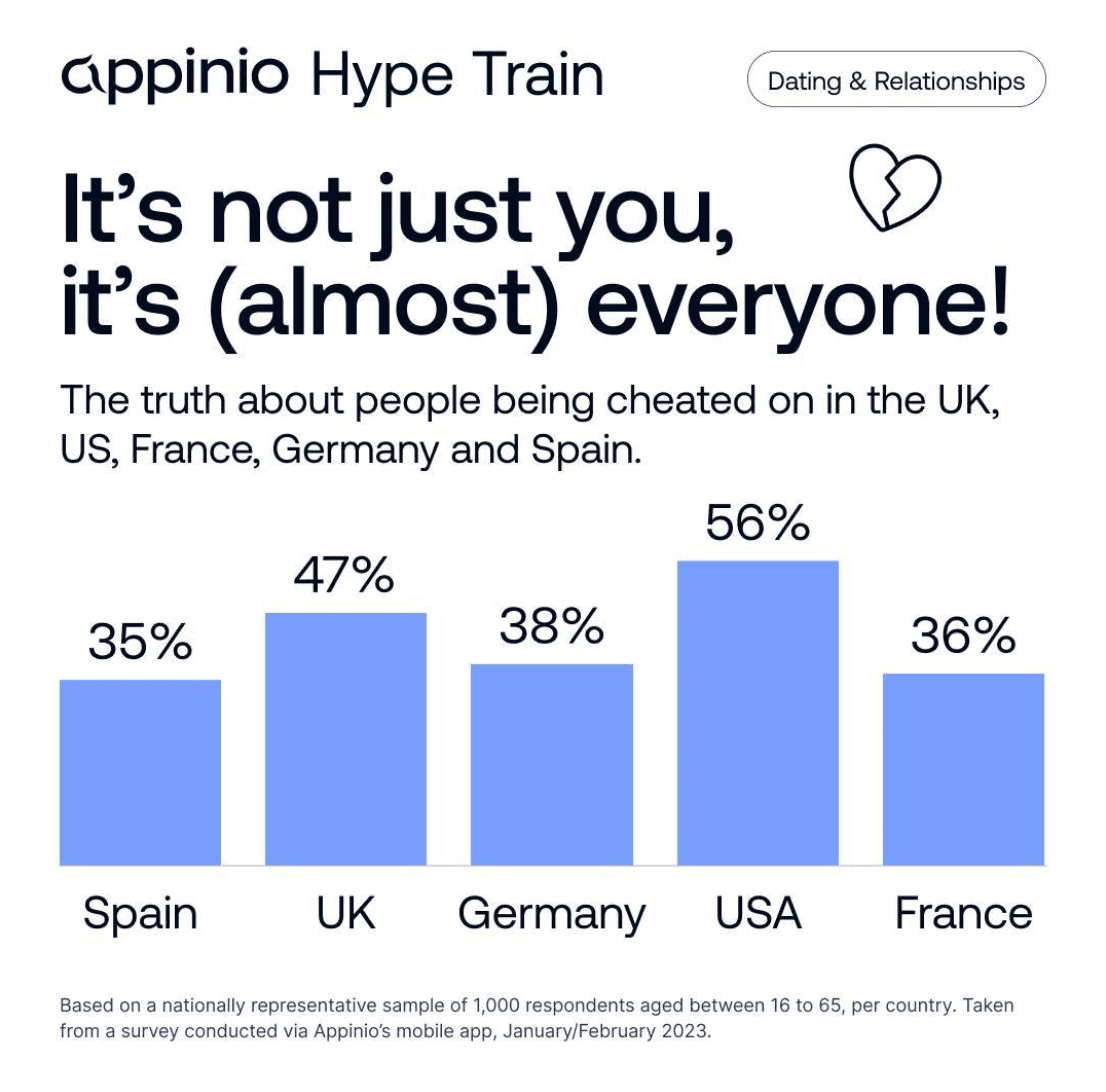
"All by myself": The challenges of being single
Being single in the modern era can be both exciting and challenging. There are countless opportunities for meeting new people and exploring different romantic possibilities. At the same time, being single can also be lonely or frustrating. The dating world can sometimes feel overwhelming or unfair to some.
In this section, we'll delve into the experiences of single people and how they navigate the world of dating, including the challenges and strategies they use for successful dating.
While attitudes towards being single have been changing in recent years, there is still a cultural bias in many societies towards the idea that being single is somehow "lesser" than being in a relationship. This bias can lead to negative stereotypes and assumptions about single people, such as the idea that they are lonely, unhappy, or unable to find a partner.
One reason for this bias is that being in a romantic relationship is often seen as a marker of success or social status. Society often places a great deal of value on romantic relationships, and those who are single may be seen as somehow lacking in this regard.
Additionally, some people may view being single as a temporary state that should be "fixed" by finding a partner, rather than a valid lifestyle choice. This attitude can lead to pressure on single people to actively seek out relationships, even if they are content with their single status.
For one in four single British people (27%), there is pressure built into the research of a romantic partner. Gen Z seems to be the most likely to say they feel pressured into dating (38%).
Those that feel pressured into dating and having a partner mention society at large as the main pressure factor (59%). It also doesn’t help that the entire economy revolves around couples and families.
It’s yesterday’s news that single people spend more than couples or families. In the current financial crisis, single people in the UK seem to be the worst hit by the bites of inflation. According to a recent article published in the Evening Standard, being single costs an extra £860 each month. Cuffing season (the period in which people begin to look for someone with whom they can spend the winter months) jokes are not so funny anymore.
Unfortunately, friends (49%) and family (43%) also figure as stress factors when it comes to feeling pressure. Could you call it a family gathering if nobody questions your sexual orientation or asks you when you will get a partner and start a family, like cousin Ashley?
"Love on the Internet": Online dating apps and their growing popularity
The Appinio Hype Train Report on Dating and Relationships shows that 30% of Brits are currently single, and the majority of them (60%) are actively looking for a partner.
Almost 27% of single Brits spend time on dating apps and websites to find a partner. The majority of them (65%) use the apps with the hope of finding a meaningful relationship. 33% of single app users find them to be (very) helpful.
Over the past decade, online dating sites and apps have become an increasingly popular way for people to connect with potential romantic partners.
Dating apps work by providing a platform for users to find a compatible partner based on shared interests, preferences, and geographic proximity.
Users need to create detailed profiles that include information about themselves. This includes their age, location, photos, and even personality test scores like the MBTI (i.e. Myers-Briggs Type Indicator). Users usually also include information on what they are looking for in a partner. This information is then used by the app's algorithm to suggest matches that meet the user's preferences.
Once a match is made, online daters can initiate a conversation through the app's messaging feature, and decide whether or not to take the conversation offline and meet in person. Some dating apps also offer additional features, such as video chat or virtual events, to help users get to know each other before meeting up in person.
Dating apps can be free or paid, with some offering additional features or perks for a fee or paid membership (i.e. freemium).
While online dating apps and dating websites have certainly revolutionised the dating world, they also have their drawbacks such as the potential for deception or disappointment. Some also argue that they can be a poor substitute for more natural, authentic in-person connections. Nonetheless, the growing popularity of online dating apps suggests that they are here to stay and that they will continue to shape the way that people approach romance and relationships in the future.
"You can't hurry love", or can you? The advantages of dating apps according to Brits
There are many reasons why dating apps and websites have become increasingly popular among online daters.
- Convenience
More than one in two Brits (55%) say that dating apps are convenient, especially for those who have busy schedules or who live in areas where it can be difficult to meet someone new. - Accessibility
One in two (50%) British online daters states that dating apps are always accessible as there are no opening times. - Ease of connecting with others
Another 48% mention that it’s easy to talk to someone on dating apps. For some people, online dating sites can be a way to reduce social barriers and make it easier to connect with others. This is particularly true for those who are shy, introverted or struggle with social anxiety. - Larger match pool
More than two in five (44%) state that dating apps offer access to a much larger dating pool of potential partners than traditional ways of meeting people and this can increase the chances of finding a compatible match. - Greater control and autonomy
Online dating allows users to have greater control and autonomy over their dating lives, as they can choose who they want to connect with and can set their own preferences for things like age, location, and interests. - App gamification
Many dating apps use gamification techniques, such as swiping and matching, that can make the process of finding a match feel more like a game or a fun activity.
"The Feels": Best dating apps according to Brits
Even if you haven’t personally used any of these dating services, you surely already have an idea of some of the most popular dating apps. Let’s go over the most used ones by Brits.
- Tinder
Launched in 2012, Tinder is one of the most well-known and widely used dating apps. It is a location-based app that allows users to swipe left or right on profiles to indicate interest. Tinder offers premium features (e.g. rewind, or super-likes) with a paid membership.
One third (33%) of Brits stated use the app. Gen Z and Millennials are the most likely to use it, both at 44%. - Plenty of Fish
The service is known for its large user base and its extensive questionnaire that helps users find compatible matches. It is a popular choice for people who are looking for a free dating app that offers a range of features and a large pool of potential matches. It has expanded into a mobile app and uses a freemium model like the apps mentioned above.
Our Appinio Hype Train Report shows that 19% of Brits use the service, making it the second most used channel to find a partner. The service is the most popular among 45-65 years-olds. - Bumble
Founded in 2014, Bumble is very similar to Tinder. The main difference is that Bumble gives women the power to make the first move when it comes to messaging potential matches. This unique feature has helped Bumble to establish itself as a feminist dating app, with a focus on empowering women in the online dating game. Like Tinder, Bumble offers extra features under a paid membership.
Bumble is the third most used app by Brits at 14% and it is more likely to be used by Millennials (24%). - Badoo
Badoo is both a website and an app that offers free and paid services to its users. It started out as a social networking site in 2006 but has since evolved into a dating-focused service. Badoo has a large user base and is available in over 190 countries, it also offers features such as photo verification and a video chat feature, which can be a useful tool for getting to know potential matches better.
Only 7% of all British online daters use Badoo, and 45-54 years-olds are the most likely to use it. - Match.com
Match.com is one of the oldest and most well-known online dating platforms, having been founded in 1995. It is known for its large user base, with millions of registered users from around the world. The app focuses on helping people find long-term, committed relationships. Match.com has now evolved into a mobile app and, like the others, offers extra features under a paid membership.
Only 5% of online daters use Match.com, but the service still secures a place in the top 5 most used apps in the UK.
"Fake Love": The disadvantages of using dating apps according to Brits
While dating apps have revolutionised the dating world in profound ways, we need to consider their drawbacks too.
- Ghosting
The Appinio Hype Train reveals that almost one in two (46%) UK online daters have been ghosted on dating apps and websites.
One of the most discussed problems of dating apps, ghosting (also known as simmering or icing) means cutting off all communication without an explanation and zero warning. This usually leaves the other person wondering what happened and feeling rejected, leaving them feeling confused, frustrated, angry, sad, or in some cases even developing feelings of general mistrust. - A focus on superficial qualities
Dating apps can encourage a focus on physical appearance and superficial qualities, rather than more meaningful connections based on shared values or interests. For instance, 41% of British online daters interviewed for the Appinio Hype Train Report mention that they pay attention to whether a potential partner looks good. - Choice paralysis
With so many options available, the large pool of potential partners on dating apps can be overwhelming. It can be difficult to sift through all the options and find the perfect match.
There are indeed algorithms that help with the sifting process, but they bring other issues to the table, like reinforcing societal biases, such as by promoting certain racial or ethnic groups over others. - Progressive inability for face-to-face interactions
Using dating apps to connect with others continues to radically change how people approach each other. People interact differently online and these behaviours may not really be applicable in face-to-face situations. - Potential for deception
One other very discussed (and televised) disadvantage of dating apps is the deception potential. It is quite common that some people on dating apps may misrepresent themselves or their intentions, even creating fake accounts (who hasn’t heard of the Netflix hit “The Tinder Swindler”?) The scammer problem dating apps have is very widespread and no dating site is immune.
Fun fact: Video-first dating app Filter Off came up with a smart, and funny, solution to the issue: locking scammers in a room with a bunch of bots. The bots leverage OpenAI GPT3 to produce human-like text and they are configured so that scammers can match only with them. But the most devious part of this ploy is that scammers would also match with other scammers, and they’d try to scam each other. Certainly a very interesting spin on the "meeting like minded people" saying.
"With or without U(I)": Singles’ opinions on dating apps design and features
In the Appinio Hype Train Report we also asked single respondents how satisfied they were with their dating app experience.
The design of the apps is the aspect with highest approval. 33% of single Brits say they are (very) satisfied with it, ogether with data privacy (33%). User friendliness ranks second at 32%, with both in-app features and quality of matches coming in third place at 26%.
When asked what dating app services single Brits were willing to pay for, 46% (the majority) state that they are not willing to pay for any additional services.
16% are willing to pay for an increased quality of matches while 14% avoid in-app ads on the dating apps, and getting unlimited swipes (13%).
"Love Language": Understanding relationship needs
But successful relationships require more than swiping right and finding a compatible match.
Love languages, a concept popularised by Gary Chapman, shed light on the importance of understanding and meeting each other's emotional needs.
According to Chapman, there are five primary love languages:
- Words of affirmation, expressing love and appreciation through kind and encouraging words.
- Acts of service, expressing love doing things that make their life easier or more enjoyable.
- Gifts, expressing love by giving gifts.
- Quality time, spending quality time together and engaging in meaningful conversations.
- Physical touch.
Each person has a unique love language and preference, namely, they have a specific way of showing love and they also have a specific preference when it comes to having their partners showing love to them.
Chapman states that by learning and understanding your partner's love language, people can effectively communicate and fulfil their emotional needs.
Furthermore, love languages are not limited to romantic relationships but can also be applied to friendships and familial relationships.
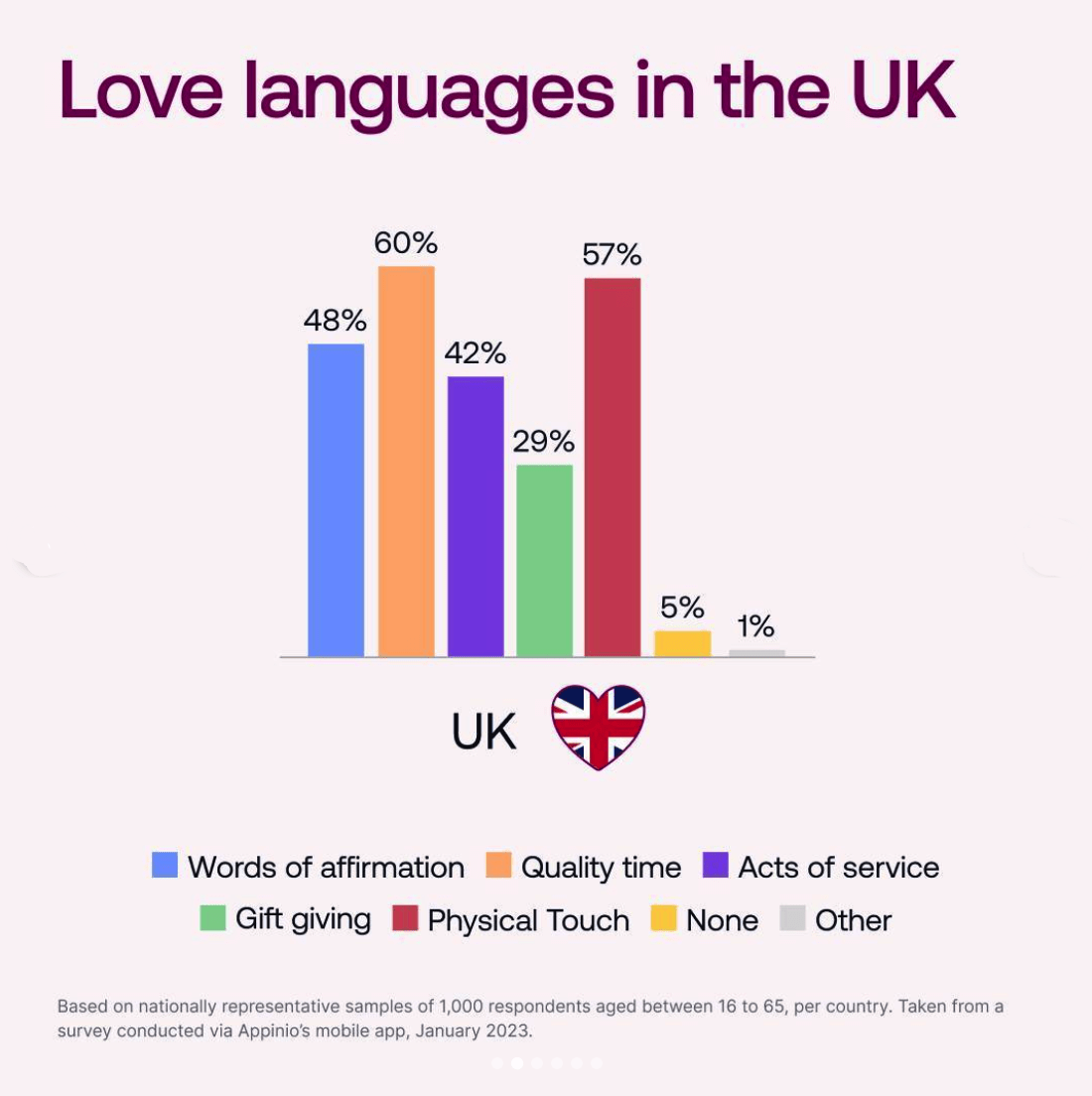
The Appinio Hype Train Report reveals that the most common love language in the UK is quality time (60%), followed by physical touch (57%) and words of affirmation (48%).
These statistics indicate that British respondents value spending meaningful time together, non-verbal affectionate gestures, and words of love and encouragement in relationships.
"I don't want to miss a thing": Newest trends in the dating and relationship landscape
For this investigation, Appinio could count on the invaluable expertise of Jorge Bueso, Senior Consumer Research and Insights Manager at Spark Networks, global dating company with an ever-growing portfolio of premium and freemium apps.

“In the UK, most are in exclusive relationships and those that are not in one are dating and looking to find a partner. Some feel pressure mostly from society at large and friends.
Online dating services come in as the 2nd leading channel they turn to for a remedy, with men finding them more helpful than women. Nearly 1 in 6 relationships have started here. Proximity (for women) and value / interest alignment with physical attractiveness (for men) are the main attention-grabbing aspects of dating profiles.”
![]()
Our Hype Tracker shows that the biggest conversations seem to be happening around:
- Gender Identity
- Ghosting
- Red Flags
- Only Fans
Incidentally, all the mentioned hypes are High Speed hypes for Gen Z respondents.
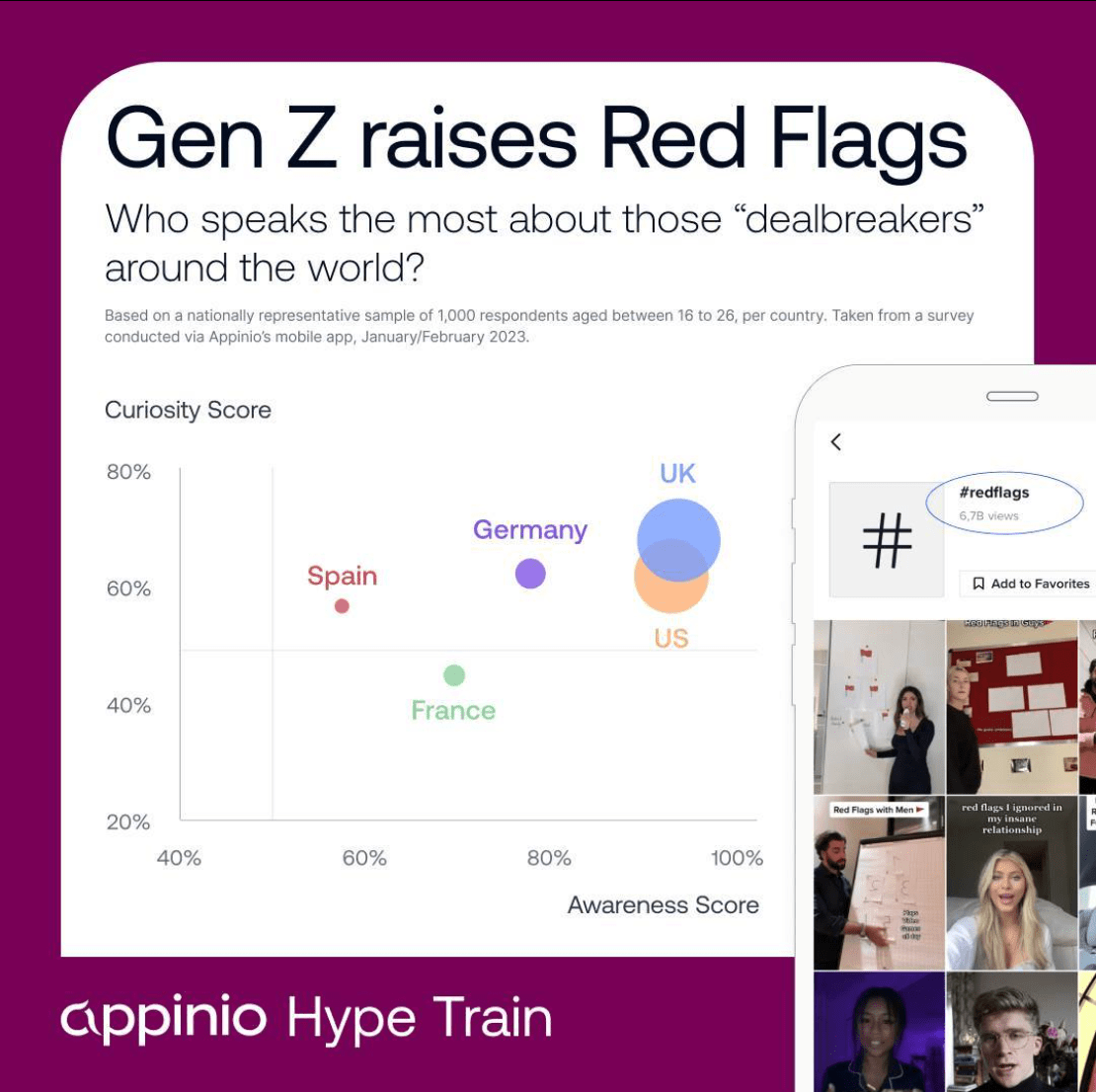 Furthermore, Gen Z all over the world seem to discuss Red Flags, however the hype seems to generate the biggest buzz in the UK and the US.
Furthermore, Gen Z all over the world seem to discuss Red Flags, however the hype seems to generate the biggest buzz in the UK and the US.
💡High Speed Hypes are hypes that are heavily discussed within the respondent's circle of friends and family.
Curious to know how the hypes performed with other age groups? Check the hype tracker on the Appinio Analyser.
"Perfect" conclusion
In conclusion, the world of dating and relationships in the UK is complex and ever-evolving. Both traditional and modern approaches coexist in a landscape shaped by technology and changing social norms.
Our study has shed light on some of the trends and patterns that define the current dating scene, from how people approach dating, the increasing popularity of dating apps to the disadvantages of these new tools.
Ultimately, our expert Jorge Bueso, has provided us with a fresh perspective on dating and given us food for thought when it comes to the newest trends in the dating and relationship world.
"Call me maybe": Want to run your own study?
Then take your market research efforts to the next level, sign up to Appinio for free and talk to us.
Biblio-playlist
- Can't help falling in love - Elvis Presley
- All by Myself - Celine Dion
- Love on the Internet - St. Lucia
- You can't hurry love - The Supremes
- The Feels - TWICE
- Fake Love - BTS
- With or Without You - US
- Love Language - Ariana Grande
- I don't want to miss a thing - Aerosmith
- Perfect - Ed Sheeran
- Call me maybe - Carly Rae Jepsen
Get facts and figures 🧠
Want to see more data insights? Our reports are just the right thing for you!
